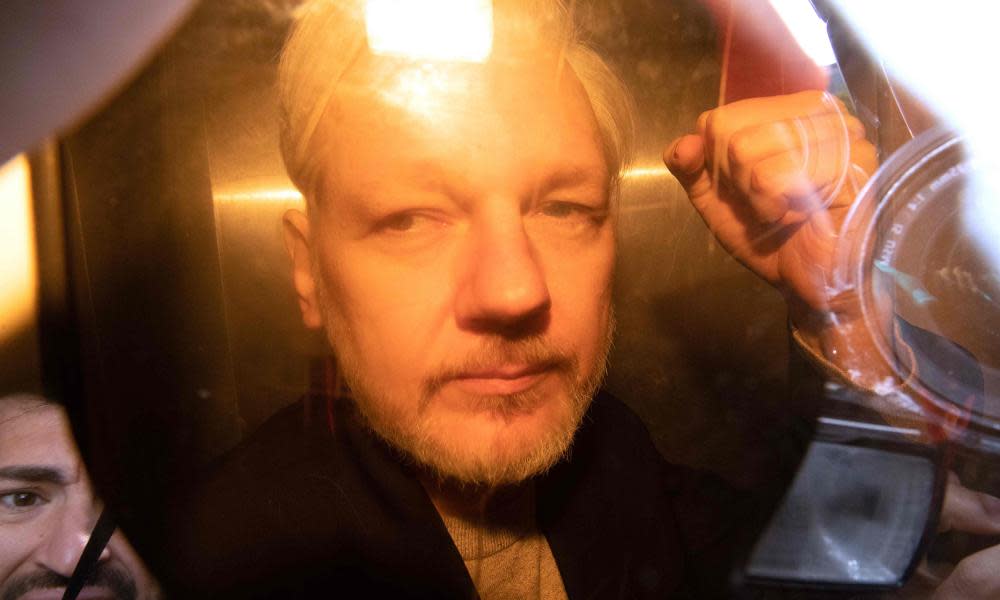Australia must oppose any move to extradite Julian Assange to US, Labor MP says

The Labor backbencher Julian Hill has declared Australia must vigorously contest any move to extradite the WikiLeaks founder Julian Assange from the United Kingdom to the United States on espionage charges.
Joining concerns about Assange expressed by the former Nationals leader Barnaby Joyce, the Victorian Labor MP told Guardian Australia: “I do hold serious concerns about [Assange’s] situation.
“He’s an Australian and at the very least we must be vigorously consistent in opposing extradition to countries where he might face the death penalty.”
Related: US efforts to jail Assange for espionage are a grave threat to a free media | Alan Rusbridger
Assange faced allegations of sexual assault in Sweden when he entered the Ecuadorian embassy in London 2012 and sought asylum because he feared being extradited to America. He spent nearly seven years in the embassy until police removed him in April after Ecuador revoked his political asylum.
The British home secretary, Sajid Javid, has signed a request for Assange to be extradited to the US where he faces charges of computer hacking.
Javid’s decision opens the way for the WikiLeaks founder to be sent to the US. Assange faces an 18-count indictment, issued by the US Department of Justice, that includes charges under the Espionage Act. He is accused of soliciting and publishing classified information and conspiring to hack into a government computer.
Australia’s shadow attorney general, Mark Dreyfus, met Assange’s lawyer, Jennifer Robinson, last month, but declined to comment after the conversation. “Mr Assange’s detention and any legal proceedings are a matter of current consideration in accordance with the British justice system and it would be inappropriate to comment while that process is under way.”
(June 1, 2010)
WikiLeaks releases about 470,000 classified military documents concerning American diplomacy and the wars in Afghanistan and Iraq. It later releases a further tranche of more than 250,000 classified US diplomatic cables.
(November 1, 2010)
A Swedish prosecutor issues a European arrest warrant for Assange over sexual assault allegations involving two Swedish women. Assange denies the claims.
(December 7, 2010)
He turns himself in to police in London and is placed in custody. He is later released on bail and calls the Swedish allegations a smear campaign.
(February 1, 2011)
A British judge rules that Assange can be extradited to Sweden. Assange fears Sweden will hand him over to US authorities who could prosecute him.
(June 19, 2012)
He takes refuge in the Ecuadorian embassy in London. He requests, and is later granted, political asylum.
(November 14, 2016)
Assange is questioned in a two-day interview over the allegations at the Ecuadorian embassy by Swedish authorities.
(January 19, 2017)
WikiLeaks says Assange could travel to the United States to face investigation if his rights are 'guaranteed'. It comes after one of the site's main sources of leaked documents, Chelsea Manning, is given clemency.
(May 19, 2017)
Swedish prosecutors say they have closed their seven-year sex assault investigation into Assange. British police say they would still arrest him if he leaves the embassy as he breached the terms of his bail in 2012.
(January 11, 2018)
Britain refuses Ecuador's request to accord Assange diplomatic status, which would allow him to leave the embassy without being arrested.
(February 13, 2018)
He loses a bid to have his British arrest warrant cancelled on health grounds.
(March 28, 2018)
Ecuador cuts off Assange's internet access alleging he broke an agreement on interfering in other countries' affairs.
(November 16, 2018)
US prosecutors inadvertently disclose the existence of a sealed indictment against Assange.
(April 2, 2019)
Ecuador's President Lenin Moreno says Assange has 'repeatedly violated' the conditions of his asylum at the embassy.
(April 11, 2019)
Police arrest Assange at the embassy on behalf of the US after his asylum was withdrawn. He is charged by the US with 'a federal charge of conspiracy to commit computer intrusion for agreeing to break a password to a classified U.S. government computer.'
(May 1, 2019)
He is jailed for 50 weeks in the UK for breaching his bail conditions back in 2012. An apology letter from Assange is read out in court, but the judge rules that he had engaged in a 'deliberate attempt to evade justice'. On the following day the US extradition proceedings were formally started.
(May 13, 2019)
Swedish prosecutors announce they are reopening an investigation into a rape allegation against Julian Assange.
(June 13, 2019)
Home secretary Sajid Javid reveals he has signed the US extradition order for Assange paving the way for it to be heard in court.
Joyce said on Monday: “Sovereignty is not just for people that you like or people that you have a philosophical relationship to, it might be for someone you detest, it might be for someone that you find completely obnoxious.
“Nonetheless, if they’re a citizen of this nation, they should be afforded the rights of a citizen.”
Government talking points, accidentally circulated to journalists on Monday, said of the Assange case: “The Australian government cannot interfere in the United Kingdom’s legal processes, just as another country cannot interfere in ours.
“We appreciate that some members of the public feel very strongly about Mr Assange’s situation but it is important to remember that Australia cannot intervene in the legal processes of another country.
“Mr Assange will be entitled to due process, including legal representation, in those processes.”

 Yahoo News
Yahoo News 
